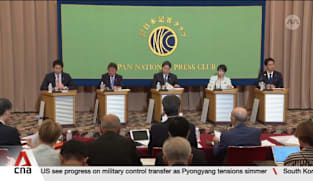Committee of Supply 2023 debate, Day 3: Josephine Teo on empowering Singaporeans to thrive in a digital future
To succeed in the digital future, Singapore needs to sustain the inspirational and protective aspects of its digital social compact, said Communications and Information Minister Josephine Teo. Speaking in Parliament on Tuesday (Feb 28), she said the Government's aspiration is for Singaporeans to seize the opportunities created through digital developments. To achieve this, it must build the foundation for infrastructure to support the digital economy and society. It needs a thoughtful and committed approach to digital infrastructure, she said. To this end, the Ministry of Communications and Information (MCI) will develop a Digital Connectivity Blueprint, which Mrs Teo said "may be a world first, if not one of the very few". It will lay out the full scope of Singapore's long-term infrastructural ambitions, as well as the groundwork to transcend resource constraints and create economic opportunities for all Singaporeans. Senior Minister of State Janil Puthucheary will co-chair an advisory panel comprising business and industry leaders. This phase of the work will take six to nine months. Besides priming the infrastructure, support for businesses will be strengthened with a new Digital Enterprise Blueprint, said Mrs Teo. This will comprehensively lay out how Singapore is promoting and supercharging digital transformation at the national, sectoral and firm levels. Mrs Teo said in pursuing Singapore's digital ambitions, it must not neglect the protective dimension of its digital social compact. These have to do with inclusion, keeping digital technologies safe for Singaporeans and keeping society united and resilient. On inclusion, she highlighted efforts to provide more affordable digital access for those who need it most. The Government will introduce a Digital Access at Home Scheme from April to provide subsidised broadband and digital services to eligible low-income Singaporean households. It has set aside about S$80 million over the next four years to fund this and expects to support 60,000 households. Turning to safety and security, the Infocomm Media Development Authority has been engaging industry partners to finalise a Code of Practice for social media services. This is expected to be implemented by the second half of the year. The Government will take another step to strengthen online safety through a new Code of Practice for app stores, which may have harmful content, especially for children. Mrs Teo said app stores should be expected to have systems and processes in place to deal with harmful content. Concluding, Mrs Teo described Singapore as one of the leading countries in digital developments, at the frontier of digital infrastructure and regulation. She said this has brought real economic payoffs. "Working with our partners, at home and abroad, I am confident we can empower Singaporeans to thrive in our digital future," she said.
To succeed in the digital future, Singapore needs to sustain the inspirational and protective aspects of its digital social compact, said Communications and Information Minister Josephine Teo. Speaking in Parliament on Tuesday (Feb 28), she said the Government's aspiration is for Singaporeans to seize the opportunities created through digital developments. To achieve this, it must build the foundation for infrastructure to support the digital economy and society. It needs a thoughtful and committed approach to digital infrastructure, she said. To this end, the Ministry of Communications and Information (MCI) will develop a Digital Connectivity Blueprint, which Mrs Teo said "may be a world first, if not one of the very few". It will lay out the full scope of Singapore's long-term infrastructural ambitions, as well as the groundwork to transcend resource constraints and create economic opportunities for all Singaporeans. Senior Minister of State Janil Puthucheary will co-chair an advisory panel comprising business and industry leaders. This phase of the work will take six to nine months. Besides priming the infrastructure, support for businesses will be strengthened with a new Digital Enterprise Blueprint, said Mrs Teo. This will comprehensively lay out how Singapore is promoting and supercharging digital transformation at the national, sectoral and firm levels. Mrs Teo said in pursuing Singapore's digital ambitions, it must not neglect the protective dimension of its digital social compact. These have to do with inclusion, keeping digital technologies safe for Singaporeans and keeping society united and resilient. On inclusion, she highlighted efforts to provide more affordable digital access for those who need it most. The Government will introduce a Digital Access at Home Scheme from April to provide subsidised broadband and digital services to eligible low-income Singaporean households. It has set aside about S$80 million over the next four years to fund this and expects to support 60,000 households. Turning to safety and security, the Infocomm Media Development Authority has been engaging industry partners to finalise a Code of Practice for social media services. This is expected to be implemented by the second half of the year. The Government will take another step to strengthen online safety through a new Code of Practice for app stores, which may have harmful content, especially for children. Mrs Teo said app stores should be expected to have systems and processes in place to deal with harmful content. Concluding, Mrs Teo described Singapore as one of the leading countries in digital developments, at the frontier of digital infrastructure and regulation. She said this has brought real economic payoffs. "Working with our partners, at home and abroad, I am confident we can empower Singaporeans to thrive in our digital future," she said.



















